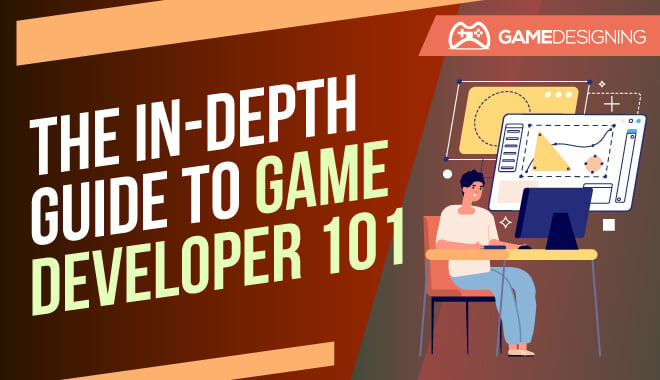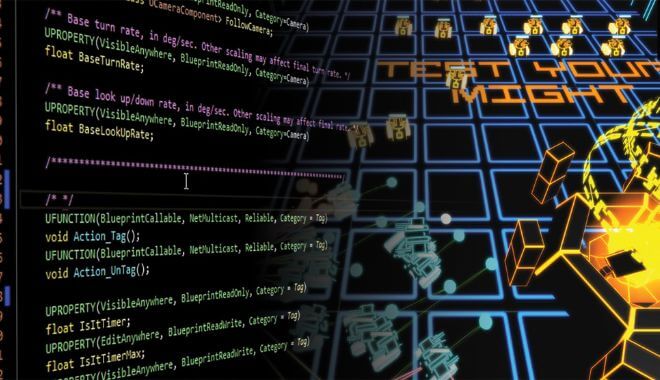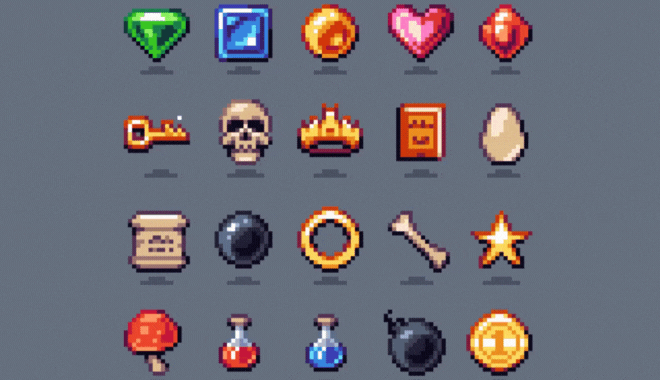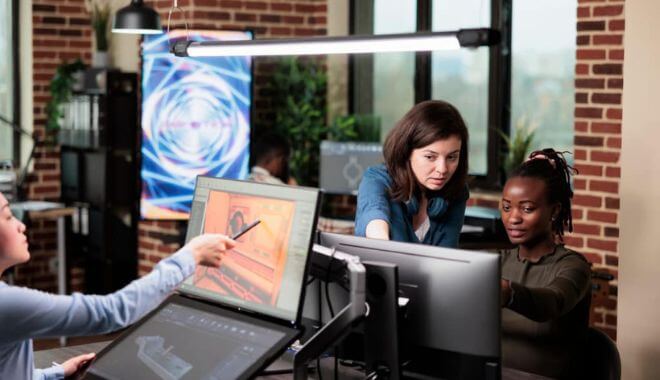 We are reader-supported. Purchases made through links on our site may earn us a commission. Learn More.
We are reader-supported. Purchases made through links on our site may earn us a commission. Learn More.
The Video Game Developer–an elusive, tempting career. Whether you’ve been coding since you were born, or been gaming since your thumbs were long enough, it’s time to do some exploring.
This job profile guide is going to take a look into the lives of game developers. We’ll peel back the curtain and see what actually goes into making entertainment for the masses.
What is a Video Game Developer?
The words game developer and programmer in this case are used interchangeably. A game developer is responsible for the creation of software and programming logic that makes a game–a game.
They could be building the artificial intelligence of the characters and creatures the player will encounter, creating the game’s mechanics, developing software tools, and troubleshooting problems as they come up.
They do all of this by writing countless lines of code and making sure each line is working as intended. For this reason, to be considered a game developer you should be fluent in several coding languages; such as C++, Javascript, and Python.
You also need to have experience working with game engines like Unity and Unreal, which power everything the developers create. But it’s not all just sitting behind a computer.
Developers have enough technical know-how and leadership skills to delegate responsibilities to Coders and need to be able to communicate with and understand the needs of the design team so they can help bring their vision to life.
In other words, without developers, you have no video game.
Game Developer Terminology 101
When it comes to video game development, a lot of job titles get thrown around. Video games, like movies, require many hands with many different skill sets to see them through.
But unlike in the film industry, general audiences have a much weaker understanding of what actually goes into making a game. For that reason, to an outsider looking in, it’s really hard to tell the difference between a programmer and a software engineer.
They are both job titles that game developers might have, but what do they mean? Here is a brief rundown of some of the most common titles.
Game Coders

This term can be confusing, as all developers must know how to use a programming language. So are all developers considered “coders”? Not exactly. A coder (sometimes called “junior developers” or “junior programmers”) is a title given to developers with the least experience.
They may only know one programming language, as opposed to several, and maybe tasked with writing basic lines of code with some oversight from the more experienced members of the team.
This doesn’t mean their work is unimportant. The biggest game projects can have many coders working at once, usually on tasks given to them by game developers. This can save the developers a lot of time, having the groundwork built for them while they focus on the trickier programming.
Game Designer

While the general public might confuse the two, game designers and game developers have entirely separate skill sets. While developers build the game and systems from the ground up, creating all of the internal logic that goes into making the game work, designers are more focused on a game’s story and art direction.
Most games will have a design team, as well as a developer team. Designers work on the art assets; writing the game’s story, and creating models and textures. Developers, by contrast, use coding to build the systems that make everything work.
Both are necessary to bring a game to life but are very different sets of skills. With that said, it’s not unheard of for a developer to also dip their toes into game design. This is especially true on indie projects, where the teams are much smaller. Experts of both fields are referred to as “technical artists”, and are highly prized members of any dev team.
Software Engineer

If game coders are the least experienced members of a development team, then software engineers are the most. They are developers who have plenty of experience under their belt, particularly in building software from the ground up.
Like developers, they have an intimate knowledge of programming languages, computer operating systems, and game engines. More so even than a game developer, a software engineer is expected to have a degree in computer science and software development.
They build the most complex systems that the dev team will use so that everything runs smoothly. On bigger projects, software engineers may even create a custom engine based on the needs of the developers programming the game. This can be risky, and costly, but a well-designed engine can also make a game’s creation go much more smoothly.
These are the most common job titles you’ll hear when it comes to game development. But different companies will have different names for their positions. What may be called a programmer in one company may be called an architect in another.
An artist may be a creative consultant, etc. But when it comes to game development, these terms are generally considered the standard.
What Does a Game Developer Do?
Now that you’ve learned what a game developer is, as well as some of the other jobs that go into programming a game, what are the responsibilities of a game developer?
Game developers will often have meetings with the design team where they’ll be instructed on what the designers intend to make. The developers have to take those ideas and try to turn them into actual game code.
As progress continues, they’ll have to playtest what they’ve created to ensure everything is working properly, and have meetings with other members of the team to see where everyone is at with their projects.
If something’s not working properly, they will have to sift through the code they’ve written and fix whatever is causing the problem. In the beginning, they need to make sure the dev team has a game engine that’s working well for them and their needs, and it may need tweaking or even a full overhaul to get it there.
Once finished, they’ll get to work helping complete other areas of the game. Like those listed below.
Game Cameras and Scenes
Whether a game is a 2D platformer or a 3D first-person shooter, there is always a camera and a scene. A scene is a specific area of a game, where all of the objects and structures will be placed during development.
The camera determines how the player will see the scene. If it’s a 3D game, for example, the camera might be centered behind the player character. If it’s a first-person shooter, the camera would instead be placed in front of the character. If the game is a real-time strategy game, the camera may be placed above the scene and pointed to the ground to give a bird’s eye view.
No matter what, it is the job of the developer to make sure the camera is working properly, not getting stuck behind objects, and giving the player optimal view and control. In addition, developers might add an effect to a camera in some circumstances.
For example, an effect could be placed onto the camera that appears to warp and shift what the player sees, giving a feeling of drunkenness. An effect might change the color scheme of the objects, to give the game a more surreal feel. It’s the responsibility of the developer to implement these effects.
Video Game Assets

Despite a game developer’s expertise leaning more towards software creation, coding, computer science, and math, there can still be a lot of creativity when it comes to programming. Most developers love video games themselves and do a lot of work behind the scenes to make the gameplay as fun as possible. But they may also get to help the design team by creating assets.
Assets are any object, item, or character that a player will see in a game. It might be a weapon the player character will use or a building they will enter. All of these need to be designed, usually by sculpting and animating 3D models, and finally applying textures to them to give them color and shading.
While asset creation is normally assigned to the design team, not the developers, on a big game project the sheer number of assets that need to be created can be overwhelming.
Developers are often tasked to lend a hand. Some developers also use their skills to help animate the 3D models once they’ve been made, even building playable demos to test how everything they’ve been coding is working.
Finally, developers can assist with the audio of a game to make sure each soundbite is activating where it needs to and at the correct volume.
Game Coding

The most important aspect of a game developer’s job is their coding work. Why?
Because the code governs everything in the game, from the physics to the gravity to when a cutscene triggers. All of the systems that make the game work.
Without the coding work of the developers, there is functionally no game. These lines of code are written in different programming languages, and then applied to a scene through the game engine.
While the player never sees it, countless files full of code are working in the background every moment of a game. All of it needed to be written, tested, debugged, and tested again by developers.
Specialties and Systems

Game development can be an all-inclusive job based on a developer’s level of experience and the size of their company. The work they do can appear everywhere, not just buried in the background behind lines of code.
It should be noted that on a smaller project the responsibilities of a programmer can be a lot bigger. Without many hands to help, they will have to dabble in everything in order to actually complete a game project. But as a member of a bigger company, developers have some freedom to specialize in a given area.
Some developers, for example, choose to specialize in developing games for a particular system, such as Playstation or PC. A game that goes to multiple platforms needs to be optimized for each, and a developer can help make that happen.
Different systems have different inputs, and the developer will have to ensure that the game works as well with a keyboard and mouse as it does a controller.
There may also be huge differences in what each system is capable of. 3D assets may need to be downgraded on a system with lower graphics capabilities, so the game isn’t bogged down by loading screens.
As most modern games appear on at least two systems, developers who can program across several are always in high demand.
A Day In The Life of A Video Game Developer

So if you were to put all of this together, what does the day of a game developer look like?
Most of the time, developers will arrive at work around 9:00 in the morning, though some may choose to begin work earlier depending on the state of development.
Usually, there is a chunk of emails to get through, and developers spend these early moments sorting through them and preparing for the day ahead. The good news about working in the game industry is that most game developers are actually salaried employees. Therefore, they have some control over when they start their shifts, as well as when they choose to end them.
With that said, as the release date draws closer, game developers can often work longer shifts to catch up to where they need to be. This is often referred to as “Crunch”, and it is an unfortunate reality for many game studios.
In the worst cases, towards the end of a games development cycle, developers may have to work long shifts for weeks at a time. Crunch does not always happen, but it is something to be prepared for if you wish to work in this field. But at the end of the day, outside of crunch, game developers have much more freedom to govern their own schedules, sharing a workspace with like-minded people united by a love of video games.
Once everyone has settled in, the lead programmer will call everyone in the team for a meeting. Meetings are a common occurrence for developers. It keeps everyone organized, and the team on track.
During a meeting, everyone will discuss where they are on their current tasks, as well as what they plan on tackling that day. In this way, developers don’t accidentally work on the same task twice, and everyone knows what they should be focusing on and who may need help. Once the meeting has ended, everyone will go about focusing on their development tasks until they decide to take a lunch break, usually between 12:00 to 1:00 pm.
The largest studios will often even provide lunch for their employees. After lunch, employees will typically return to their tasks. Throughout the day, there may be several smaller meetings between team members to make sure everything is going smoothly.
Often this includes a playtesting phase, where the developers will play a basic version of a scene they’re working on. This is important, as it allows them to test the functionality of their code in real-time.
Developers usually end their days around 7:00 to 8:00 pm, though some may choose to work later. Creating a game can be a lot of work, but these are not usually lone projects.
How a developer works and relates to their team can make a huge difference to the game. A fun team that enjoys each other’s company will almost always show better results than a group that doesn’t. Communication and social skills, while not the most important aspect of game development, are very important to have as a game developer.
How To Become A Video Game Developer

So now that you’ve learned what a game developer is, what steps would you have to take to become one?
To start, almost all game developers have at least a bachelor’s degree. Developers need to have an excellent understanding of computer science, know how to code in several programming languages and have some understanding of physics or software creation.
This is often achieved by attending a four-year college or university degree course. As computers have become an essential part of almost any business, most colleges and universities offer courses that can help you get the skills you need, though they may not be catered specifically to game development itself.
Luckily, there are plenty of accredited online courses out there that do!
You can learn how to create 3D models, use game engines, write in a programming language, and network all from the comfort of your own home. The only weakness with this method is that established colleges and universities carry some weight with employers on name recognition alone.
Having a degree from UAT for example may have more sway on whether a big game studio will take you into consideration. Even so, game studios are most interested in the kind of work you can put out, not the school that you came from. So to really become a game developer, you will have to create a developer portfolio.
A developer portfolio is a visual collection of your best work. Even without a degree, if you can show off a small, well-designed level that you made yourself, or the various code you’ve written put into action in a piece of software, you’ll be able to show them exactly why you’d be a valuable asset to the team.
Whether you’re a graphic artist or a developer, resumes handed off to game studios are expected to have a portfolio of their work. Just make sure you fill your portfolio with work specific to game development itself. It’s good to show that you can do many different sorts of projects, but even better to show you can do one thing really well.
Finally, don’t be discouraged if you start out as a coder, rather than a game developer. It’s not uncommon at all for coders to be promoted upwards, once they’ve proven their skill. On a game project, the more tasks you’re able to complete, and the more technical skills you develop, the higher you can go.
What Is A Game Developer’s Salary?
The average salary of a video game coder is $59,000 a year. But a full-fledged video game developer can make an average of $66,000 to $70,000 per year.
The nice thing about game development is there is room for promotion. The more aspects of game development you’re able to work on and complete, the more valued a member of the team you can become.
In the largest studios, lead game developers are making over $100,000 a year on average. It should be noted, however, that these metrics can vary from studio to studio, especially when it comes to Indie developers. The resources an Indie game project might have at its disposal are much smaller, and workers sometimes, though not always, fall below the $66, 000 a year average.
Developer Career Paths
People tend to enter into a career in video game development out of a love for video games, and then stay there for the salaries and flexibility. But that doesn’t mean they have to be stuck. In fact, being a video game developer can open doors to a host of other careers, such as:
Indie Game Development

Many developers start out their careers by working with studios. As they do, they improve their coding skills, make friends and future concepts, and get a read on what it actually takes to finish a video game. While this is certainly steady work, it’s not uncommon for developers to take what they’ve learned and try to make a video game of their own.
After all, working for a large studio means you’ll always be working on a game idea somebody else decided on. For someone who wants a chance at creating something uniquely their own, forming an indie studio is the way to go. Indie games do not have the same budget as AAA titles, but what they lack in resources they make up for in freedom.
Teaching Game Development

Developers with some experience might see fit to help the next generation of game makers. Creating video games can actually give you the experience you need to teach subjects such as computer science, graphic art, and as well as game development courses. Average salaries for game development teachers are $60,000 a year, making it an excellent way to contribute to the industry you love without actually developing games yourself.
Technical Artist

Some developers find that the longer they work on game projects, the more they take an interest in the other side of game creation– design. Maybe on top of writing lines of code, a developer wants to contribute more to the art direction of the game. It’s a lot of work, but if they can get their artistic skills to the same level as their coding, they could become a technical artist.
As mentioned earlier, technical artists contribute to both the design and development teams, creating art assets, building software, modeling and texturing, building game environments, they can do it all!
Because they’re so adaptable to the needs of a project, technical artists are highly sought after by game studios and are paid accordingly. So if you’ve already mastered game development, but want to contribute more creatively to the games you make, becoming a technical artist could be the perfect career path for you.
In Conclusion
Video game developers create the foundations that hold a video game together. They are master software developers who don’t just see the beautiful landscapes and compelling narratives of the game when it’s finished, but the thousands and thousands of lines of code, invisibly running in the background to make everything run.
When a player feels satisfied after defeating an enemy or making that tricky jump, it was the developers who built those mechanics. When a player peeks around a corner to spot an enemy, it was the developers who built the digital camera they’re using.
If you have a mind for mathematics, understanding codes, and learning how things work, consider looking into video game development. For most developers, it’s more than a career. It’s a passion.
Image sources:
https://www.nfi.edu/technical-artist/
https://sae.edu.au/courses/games/bachelor-of-games-development/
https://www.phoenix.edu/blog/programmer-vs-software-engineer-key-differences.html
https://lafayette.aie.edu/program/advanced-diploma-of-professional-game-development-game-programming/




Leave a Reply